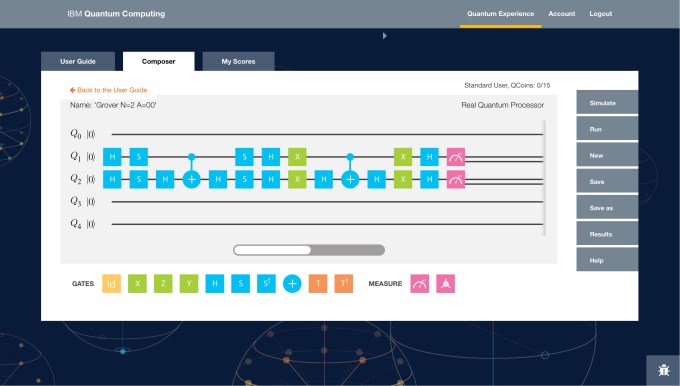Quantum computing is still very much in the early research stage, but IBM is hoping to accelerate the progress around it by making a quantum computer available to researchers as a cloud service. It is a bold and ambitious idea, although still very much a small step in trying to understand quantum computing processing.
IBM is allowing interested parties to access a 5 qubit quantum computer it’s calling IBM Quantum Experience. The actual hardware is sitting in the IBM Research Lab in New York State. IBM is providing a programming interface and the ability to run experimental programs on an actual quantum computer.
Among the challenges here are that quantum computers take enormous cooling systems that in some cases are colder than outer space (we’re talking seriously cold). What’s more, they maintain so much information, none of which is necessarily static, keeping all of that information available long enough for meaningful analysis is an enormous task. These challenges are akin to balancing an egg on the tip of a pencil, then figuring out why it fell, Jerry Chow, Manager of the Experimental Quantum Computing Group at IBM Research explained.
The programming language IBM created for this project operates almost like writing music. The programmer can simply drag quantum objects to the “staff” to write a program.

Charles King, principal analyst at Pund-IT, Inc. says quantum computers are different from conventional computers in a couple of essential ways.
“For one, while conventional systems are designed on binary principles (where opening/closing semiconductor gates represents on/off, or 0/1) quantum systems utilize “qubits’ which can be on, off or both on and off. In theory, that will allow resulting systems to perform functions on data utilizing phenomena from quantum mechanics, such as superposition and entanglement,” King explained to TechCrunch in an email.
IBM has created its own quantum chip running at 5 qubits. Chow estimates that it could take a machine running between 50 and 100 qubits to surpass the capabilities of today’s fastest super computers. We have a ways to go here, but this is a good starting point.
But getting there is harder than simply following Moore’s Law with digital computers on silicon chips. While IBM is still using silicon, there are a couple of huge hurdles involved in getting more consistent usage. First of all there is building the computer and second figuring out how to program it, Earl Joseph, who covers high performance computing for IDC explained in an email.
“This experiment provides the opportunity for a large group of people to start to learn how to program quantum computers, which will help to develop ways to use this new type of technology,” Joseph wrote.
He points out there are other such experiments in progress. “NASA Ames and Google are doing some very interesting work. The large home run will be from a more general purpose and large size quantum computer. I think it will be an evolutionary process, with more applications coming on line every few years.”
The hope is that by offering this tool, it will help propel interest and understanding of quantum computing and create a community of interested individuals, institutions and researchers who can work together to advance knowledge about these computers in the coming years.






























Comment